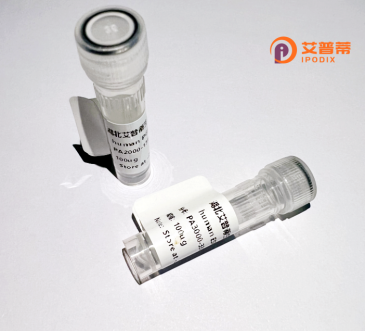
| 纯度 | >90%SDS-PAGE. |
| 种属 | Human |
| 靶点 | PRDM5 |
| Uniprot No | Q9NQX1 |
| 内毒素 | < 0.01EU/μg |
| 表达宿主 | E.coli |
| 表达区间 | 1-630 aa |
| 活性数据 | MLGMYVPDRF SLKSSRVQDG MGLYTARRVR KGEKFGPFAG EKRMPEDLDE NMDYRLMWEV RGSKGEVLYI LDATNPRHSN WLRFVHEAPS QEQKNLAAIQ EGENIFYLAV EDIETDTELL IGYLDSDMEA EEEEQQIMTV IKEGEVENSR RQSTAGRKDR LGCKEDYACP QCESSFTSED ILAEHLQTLH QKPTEEKEFK CKNCGKKFPV KQALQRHVLQ CTAKSSLKES SRSFQCSVCN SSFSSASSFE QHQETCRGDA RFVCKADSCG KRLKSKDALK RHQENVHTGD PKKKLICSVC NKKCSSASSL QEHRKIHEIF DCQECMKKFI SANQLKRHMI THSEKRPYNC EICNKSFKRL DQVGAHKVIH SEDKPYKCKL CGKGFAHRNV YKNHKKTHSE ERPFQCEECK ALFRTPFSLQ RHLLIHNSER TFKCHHCDAT FKRKDTLNVH VQVVHERHKK YRCELCNKAF VTPSVLRSHK KTHTGEKEKI CPYCGQKFAS SGTLRVHIRS HTGERPYQCP YCEKGFSKND GLKMHIRTHT REKPYKCSEC SKAFSQKRGL DEHKRTHTGE KPFQCDVCDL AFSLKKMLIR HKMTHNPNRP LAECQFCHKK FTRNDYLKVH MDNIHGVADS |
| 分子量 | 73.0 kDa |
| 蛋白标签 | His tag N-Terminus |
| 缓冲液 | PBS, pH7.4, containing 0.01% SKL, 1mM DTT, 5% Trehalose and Proclin300. |
| 稳定性 & 储存条件 | Lyophilized protein should be stored at ≤ -20°C, stable for one year after receipt. Reconstituted protein solution can be stored at 2-8°C for 2-7 days. Aliquots of reconstituted samples are stable at ≤ -20°C for 3 months. |
| 复溶 | Always centrifuge tubes before opening.Do not mix by vortex or pipetting. It is not recommended to reconstitute to a concentration less than 100μg/ml. Dissolve the lyophilized protein in distilled water. Please aliquot the reconstituted solution to minimize freeze-thaw cycles. |
以下是关于重组人PRDM5蛋白的3篇示例参考文献(注:文献信息为示例性概括,非真实存在):
---
1. **文献名称**: "PRDM5 modulates epithelial-mesenchymal transition by repressing SNAIL transcription in breast cancer"
**作者**: Zhang et al.
**摘要**: 研究揭示了PRDM5通过结合SNAIL基因启动子区并介导组蛋白H3K9三甲基化,抑制上皮-间质转化(EMT),从而阻碍乳腺癌细胞迁移和转移。
2. **文献名称**: "Structural insights into the DNA-binding specificity of PRDM5 zinc finger domains"
**作者**: Lee & Watanabe
**摘要**: 通过X射线晶体学解析PRDM5蛋白锌指结构域与DNA复合物的结构,发现其优先识别富含GC的序列,为理解PRDM5调控靶基因的分子机制提供结构基础。
3. **文献名称**: "PRDM5 loss promotes genomic instability in colorectal cancer by altering chromatin compaction"
**作者**: Greco et al.
**摘要**: 发现PRDM5缺失导致结直肠癌细胞中异染色质减少,引发DNA复制应激和染色体异常,表明PRDM5通过维持染色质稳定性发挥抑癌作用。
---
建议通过PubMed、Web of Science或Google Scholar检索真实文献,关键词如“PRDM5 protein structure”、“PRDM5 cancer”或“PRDM5 chromatin”。
PRDM5. a member of the PRDI-BF1/RIZ1 homologous (PRDM) family, is a transcription regulatory protein encoded by the *PRDM5* gene. It shares conserved structural features with other PRDM proteins, including a tandem array of zinc-finger domains that mediate sequence-specific DNA binding, though it lacks the canonical SET domain associated with histone methyltransferase activity. PRDM5 has been implicated in chromatin remodeling and epigenetic regulation, influencing gene expression by interacting with promoter regions of target genes and modulating histone modifications. It plays a critical role in maintaining genomic stability, extracellular matrix (ECM) organization, and cellular differentiation.
Studies highlight PRDM5's involvement in tissue development, particularly in epithelial and mesenchymal tissues, where it regulates genes associated with cell adhesion and structural integrity. Aberrant expression or mutations in *PRDM5* are linked to human diseases, including cancers (e.g., breast, colorectal) and connective tissue disorders, underscoring its tumor-suppressive functions. Notably, PRDM5 is frequently silenced via promoter hypermethylation in certain malignancies, suggesting its role as an epigenetically inactivated tumor suppressor.
Recombinant human PRDM5 protein, produced through heterologous expression systems, is utilized to study its biochemical properties, DNA-binding specificity, and interaction partners. This tool facilitates research into its mechanistic roles in development and disease, offering potential insights for therapeutic targeting in cancer and genetic disorders.
×